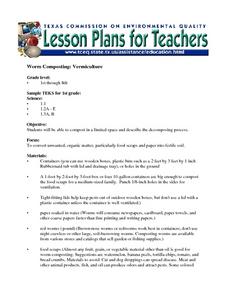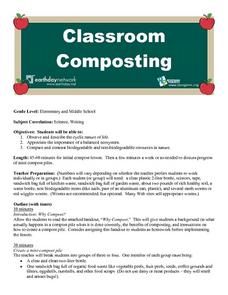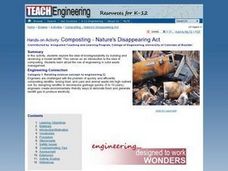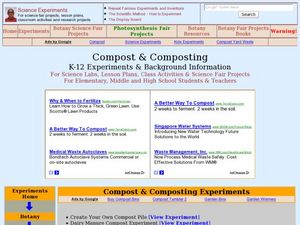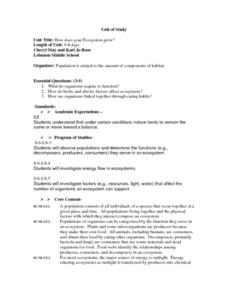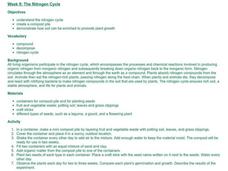Virginia Department of Education
The Effects of Heat and Acid on the Enzyme Catalase
How quickly do enzymatic reactions occur? Assist the class as they examine heat and pH change to determine the rate of chemical reactions using catalase as an enzyme. Watch them "glow" with excitement!
Curated OER
Who Eats Whom in the Salt Marsh?
Seventh graders complete a virtual online salt marsh tour. In groups, they observe and identify the various types of animals found in the marsh. After categorizing the animals, they create a food web based on the animals role in the...
Curated OER
Worm Composting: Vermiculture
Students set up their own composting bin. They observe and record their findings during a period of time. They describe the decomposing process as well.
Curated OER
Cows, Worms, and Compost
Students study decomposition. For this decomposition lesson, students discuss the background information about decomposition. Students then complete the 'Chew It Twice' worksheet.
Curated OER
Classroom Composting
Learners discover the benefits of composting. They identify the steps of decomposition as well. They are read a book and discuss what items decompose.
Curated OER
Rainforest Vocabulary Words: Week 1
In these rainforest vocabulary worksheets, read the definitions and the matching terms for the following rainforest vocabulary terms: decomposers, deforestation, epiphytes, extinct, environment, pollute, vegetation, ecology, climate,...
Curated OER
Ecological Relationships
Middle schoolers identify ecological elements and their factors on species, populations and food webs. They analyze ecosystems for these elements and research how these factors influence species survival rate. Predictions on conditions...
Curated OER
The Nitrogen Cycle
Fifth graders investigate the nitrogen cycle and examine the concepts of decomposition and nitrification. Students participate in a class discussion about the creation of waste and ammonia compounds, then using nitrogen cycle cut-outs...
Curated OER
Composting -- Nature's Disappearing Act
Studenst work together to discover the concept of biodegradability. They build a model of a landfill and how different items decompose. They examine how engineers use this information for better waste management.
Curated OER
Investigating the Uses of Backyard Bacteria
Students discover that the answers to some of society's waste and clean-up problems may be no further than the soil beneath their feet. They perform a Gram stain on the colonies to determine some of their characteristics.
Curated OER
Compost and Composting Experiments
Students investigate the composting process through a variety of experiments. For this ecology lesson, students discuss the benefits of composting. They examine how compost affect plant growth.
Curated OER
Nature's Recycling Program
Students identify what materials make up compost. In this science of recycling lesson, students explain the benefits of composting determine how compost is a good plant fertilizer.
Curated OER
Worm Compost & Vermicomposting
Students explore vermicomposting, the species of worms needed and the proper climate for it. In this composting lesson plan students make their own worm compost bin.
Curated OER
A Design You’ll Dig: Designing a Habitat for Worms
Students discover how worms contribute to the balance of the environment. In this composting lesson plan, students study the composting and decomposition processes. Students then create habitats for worms that allow them to do their jobs.
Nuffield Foundation
Microbes Ate My Homework
Now you have a new excuse not to do your homework. A long-term experiment has learners explore cellulose-digesting enzymes. They simulate how paper breaks down in a compost bin. There's no need to blame your dog for eating your homework...
University of Kentucky
Beneficial Bug Scavenger Hunt
Many people think of bugs as annoying pests to be squashed, but most insects and spiders are beneficial, eating the actual pests or pollinating plants. After reviewing some of the common bugs in your area (they may differ from those...
Curated OER
How Does Your Ecosystem Grow?
Students consider that under certain conditions in nature tend to remain the same or move toward a balance. They observe populations and determine the functions (e.g., de-composers, producers, consumers) they serve in an ecosystem. They...
Curated OER
Composting
In this recognizing items that can be composted learning exercise, students identify organic items that can be composted, write items that can be composted for each of the letters in the word compost, and make a list of vegetables and...
Curated OER
Ocean Pollution
Students explore ocean pollution. In this ecology lesson, students view a video entitled This Pretty Planet and identify common biodegradable products. Students participate in activities designed to simulate the negative effects of...
Curated OER
Ecology
In this ecology worksheet learners complete a crossword puzzle that incorporates all of the ecological vocabulary in the word puzzle.
Curated OER
Insect Conservation
Students make a diorama. In this insect lesson, students review what they know and what they need to know about insects. Students define conservation, discuss why it is important to conserve insects, and make an insect diorama.
Curated OER
The Principles Of Composting
Students put items in a plastic bag and watch the effects of composting. While completing the experiment, students answer questions and ask permission to start their own compost pile at home.
Curated OER
De"compost"ition Activity
Students investigate the decomposition process and the parameters which influence the rate at which it occurs. They design a "controlled" experiment by comparing decomposition rates between two compost piles. Analysis questions include...
Curated OER
The Nitrogen Cycle
Students design and create a compost pile in order to study the Nitrogen Cycle. They then use the scientific method to determine if plants grow better when they add organic matter from their compost pile to the plant's soil.




